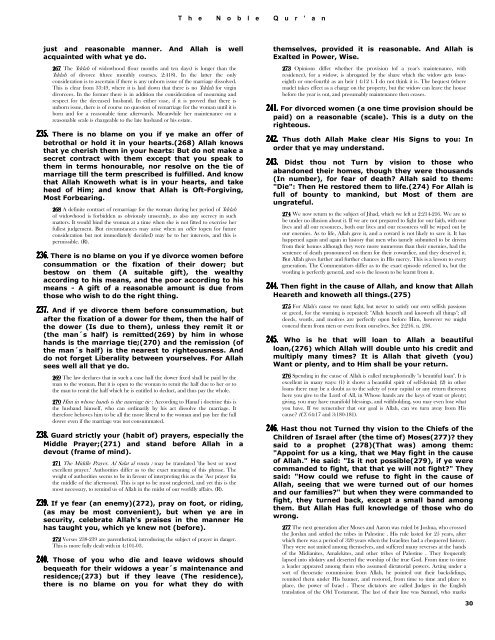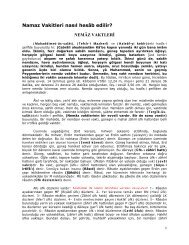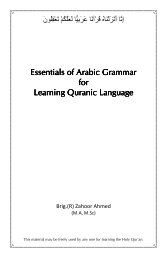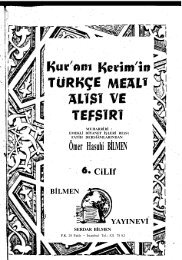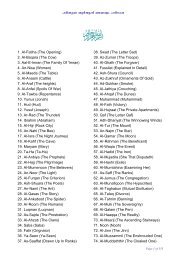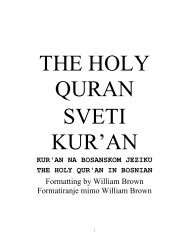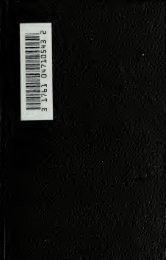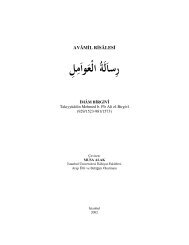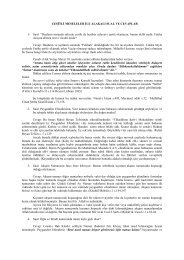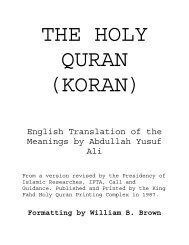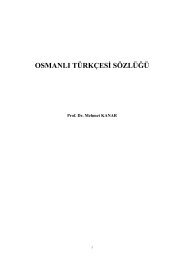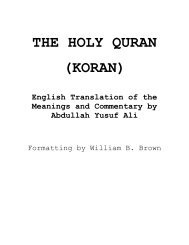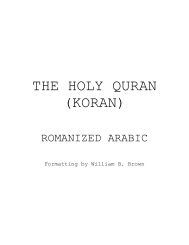English Quran with Commentaries By Yusuf-ali - HolyBooks.com
English Quran with Commentaries By Yusuf-ali - HolyBooks.com
English Quran with Commentaries By Yusuf-ali - HolyBooks.com
- No tags were found...
You also want an ePaper? Increase the reach of your titles
YUMPU automatically turns print PDFs into web optimized ePapers that Google loves.
T h e N o b l e Q u r ’ a n<br />
just and reasonable manner. And Allah is well<br />
acquainted <strong>with</strong> what ye do.<br />
267 The 'Iddah of widowhood (four months and ten days) is longer than the<br />
'Iddah of divorce (three monthly courses. 2:418). In the latter the only<br />
consideration is to ascertain if there is any unborn issue of the marriage dissolved.<br />
This is clear from 33:49, where it is laid down that there is no 'Iddah for virgin<br />
divorcees. In the former there is in addition the consideration of mourning and<br />
respect for the deceased husband. In either case, if it is proved that there is<br />
unborn issue, there is of course no question of remarriage for the woman until it is<br />
born and for a reasonable time afterwards. Meanwhile her maintenance on a<br />
reasonable scale is chargeable to the late husband or his estate.<br />
235. There is no blame on you if ye make an offer of<br />
betrothal or hold it in your hearts.(268) Allah knows<br />
that ye cherish them in your hearts: But do not make a<br />
secret contract <strong>with</strong> them except that you speak to<br />
them in terms honourable, nor resolve on the tie of<br />
marriage till the term prescribed is fulfilled. And know<br />
that Allah Knoweth what is in your hearts, and take<br />
heed of Him; and know that Allah is Oft-Forgiving,<br />
Most Forbearing.<br />
268 A definite contract of remarriage for the woman during her period of 'Iddah<br />
of widowhood is forbidden as obviously unseemly, as also any secrecy in such<br />
matters. It would bind the woman at a time when she is not fitted to exercise her<br />
fullest judgement. But circumstances may arise when an offer (open for future<br />
consideration but not immediately decided) may be to her interests, and this is<br />
permissible. (R).<br />
236. There is no blame on you if ye divorce women before<br />
consummation or the fixation of their dower; but<br />
bestow on them (A suitable gift), the wealthy<br />
according to his means, and the poor according to his<br />
means - A gift of a reasonable amount is due from<br />
those who wish to do the right thing.<br />
237. And if ye divorce them before consummation, but<br />
after the fixation of a dower for them, then the half of<br />
the dower (Is due to them), unless they remit it or<br />
(the man´s half) is remitted(269) by him in whose<br />
hands is the marriage tie;(270) and the remission (of<br />
the man´s half) is the nearest to righteousness. And<br />
do not forget Liber<strong>ali</strong>ty between yourselves. For Allah<br />
sees well all that ye do.<br />
269 The law declares that in such a case half the dower fixed shall be paid by the<br />
man to the woman. But it is open to the woman to remit the half due to her or to<br />
the man to remit the half which he is entitled to deduct, and thus pay the whole.<br />
270 Him in whose hands is the marriage tie : According to Hanaf i doctrine this is<br />
the husband himself, who can ordinarily by his act dissolve the marriage. It<br />
therefore behoves him to be all the more liberal to the woman and pay her the full<br />
dower even if the marriage was not consummated.<br />
238. Guard strictly your (habit of) prayers, especially the<br />
Middle Prayer;(271) and stand before Allah in a<br />
devout (frame of mind).<br />
271 The Middle Prayer. Al Salat al wusta : may be translated "the best or most<br />
excellent prayer." Authorities differ as to the exact meaning of this phrase. The<br />
weight of authorities seems to be in favour of interpreting this as the 'Asr prayer (in<br />
the middle of the afternoon). This is apt to be most neglected, and yet this is the<br />
most necessary, to remind us of Allah in the midst of our worldly affairs. (R).<br />
239. If ye fear (an enemy)(272), pray on foot, or riding,<br />
(as may be most convenient), but when ye are in<br />
security, celebrate Allah's praises in the manner He<br />
has taught you, which ye knew not (before).<br />
272 Verses 238-239 are parenthetical, introducing the subject of prayer in danger.<br />
This is more fully dealt <strong>with</strong> in 4:101-03.<br />
240. Those of you who die and leave widows should<br />
bequeath for their widows a year´s maintenance and<br />
residence;(273) but if they leave (The residence),<br />
there is no blame on you for what they do <strong>with</strong><br />
themselves, provided it is reasonable. And Allah is<br />
Exalted in Power, Wise.<br />
273 Opinions differ whether the provision (of a year's maintenance, <strong>with</strong><br />
residence), for a widow, is abrogated by the share which the widow gets (oneeighth<br />
or one-fourth) as an heir ( 4:12 ). I do not think it is. The bequest (where<br />
made) takes effect as a charge on the property, but the widow can leave the house<br />
before the year is out, and presumably maintenance then ceases.<br />
241. For divorced women (a one time provision should be<br />
paid) on a reasonable (scale). This is a duty on the<br />
righteous.<br />
242. Thus doth Allah Make clear His Signs to you: In<br />
order that ye may understand.<br />
243. Didst thou not Turn by vision to those who<br />
abandoned their homes, though they were thousands<br />
(In number), for fear of death? Allah said to them:<br />
"Die": Then He restored them to life.(274) For Allah is<br />
full of bounty to mankind, but Most of them are<br />
ungrateful.<br />
274 We now return to the subject of Jihad, which we left at 2:214-216. We are to<br />
be under no illusion about it. If we are not prepared to fight for our faith, <strong>with</strong> our<br />
lives and all our resources, both our lives and our resources will be wiped out by<br />
our enemies. As to life, Allah gave it, and a coward is not likely to save it. It has<br />
happened again and again in history that men who tamely submitted to be driven<br />
from their homes although they were more numerous than their enemies, had the<br />
sentence of death pronounced on them for their cowardice, and they deserved it.<br />
But Allah gives further and further chances in His mercy. This is a lesson to every<br />
generation. The Commentators differ as to the exact episode referred to, but the<br />
wording is perfectly general, and so is the lesson to be learnt from it.<br />
244. Then fight in the cause of Allah, and know that Allah<br />
Heareth and knoweth all things.(275)<br />
275 For Allah's cause we must fight, but never to satisfy our own selfish passions<br />
or greed, for the warning is repeated: "Allah heareth and knoweth all things"; all<br />
deeds, words, and motives are perfectly open before Him, however we might<br />
conceal them from men or even from ourselves. See 2:216. n. 236.<br />
245. Who is he that will loan to Allah a beautiful<br />
loan,(276) which Allah will double unto his credit and<br />
multiply many times? It is Allah that giveth (you)<br />
Want or plenty, and to Him shall be your return.<br />
276 Spending in the cause of Allah is called metaphorically "a beautiful loan". It is<br />
excellent in many ways: (1) it shows a beautiful spirit of self-denial; (2) in other<br />
loans there may be a doubt as to the safety of your capital or any return thereon;<br />
here you give to the Lord of All, in Whose hands are the keys of want or plenty;<br />
giving, you may have manifold blessings, and <strong>with</strong>holding, you may even lose what<br />
you have. If we remember that our goal is Allah, can we turn away from His<br />
cause? (Cf. 64:17 and 3:180-181).<br />
246. Hast thou not Turned thy vision to the Chiefs of the<br />
Children of Israel after (the time of) Moses(277)? they<br />
said to a prophet (278)(That was) among them:<br />
"Appoint for us a king, that we May fight in the cause<br />
of Allah." He said: "Is it not possible(279), if ye were<br />
<strong>com</strong>manded to fight, that that ye will not fight?" They<br />
said: "How could we refuse to fight in the cause of<br />
Allah, seeing that we were turned out of our homes<br />
and our families?" but when they were <strong>com</strong>manded to<br />
fight, they turned back, except a small band among<br />
them. But Allah Has full knowledge of those who do<br />
wrong.<br />
277 The next generation after Moses and Aaron was ruled by Joshua, who crossed<br />
the Jordan and settled the tribes in Palestine . His rule lasted for 25 years, after<br />
which there was a period of 320 years when the Israelites had a chequered history.<br />
They were not united among themselves, and suffered many reverses at the hands<br />
of the Midianites, Amalekites, and other tribes of Palestine . They frequently<br />
lapsed into idolatry and deserted the worship of the true God. From time to time<br />
a leader appeared among them who assumed dictatorial powers. Acting under a<br />
sort of theocratic <strong>com</strong>mission from Allah, he pointed out their backslidings,<br />
reunited them under His banner, and restored, from time to time and place to<br />
place, the power of Israel . These dictators are called Judges in the <strong>English</strong><br />
translation of the Old Testament. The last of their line was Samuel, who marks<br />
30


